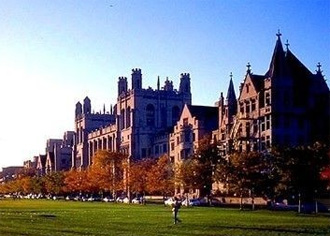(单词翻译:单击)
“Think Independently” is the primary educational principle of Harvard University. Consciously, Harvard professors implement the principle in every specific teaching procedure. They point out clearly that their relationship with students is cooperative, rather than hierarchical. In class, Harvard professors’ mainly provide students with clues and references. Rarely will they give the answers directly. They see themselves as guides, promoters, and cothinkers, instead of knowledge-imparters and answer-providers. Harvard professors have been used to pointed and forthright questions and critiques. The students they like most are those who dare to and have the ability to challenge teachers. They also give these students the highest scores. Most professors even believe that the classes in which there is no challenge from students are the most boring and the most unsuccessful classes.
独立思考是哈佛大学的第一教育原则。哈佛教授有意识地把独立思考原则落实到 教学的每一个具体环节上。他们非常明确地指出,他们和学生的关系是合作关系,而 绝非等级关系。在课堂上,哈佛教授主要是提供思考的线索和参照,很少直接提供答案。 他们视自己为引导者、推动者和共同思考者,而不是知识传授者和答案给予者。哈佛 教授们早就习惯了学生尖锐直率的质疑和批判,他们最喜爱的、给分最高的都是那些 敢于并有能力挑战老师的学生。许多教授甚至觉得,没有受到学生挑战的课是最沉闷 无聊的课,也是最不成功的课。

Harvard students are used to this equal relationship between teachers and students as well, which in turn make them brave enough to challenge any authority. As professors appear to be “humble” in front of students, they are even the targets of students’ jokes. Harvard professors are human beings, and they like the feeling of being respected and adored. But “authority" cannot win respect. They believe that they must first encourage students to think independently and challenge authority, cultivate students’ skeptical spirits, and guide a variety of views to cross swords. Only by doing so can they create an atmosphere that is equal, free, and unfettered, can they evoke students,spirits of innovation and quest to the utmost extent, and win real respect from students. At Harvard, you’ll often see such a scene: when a professor has left,students keeps applauding until they think the professor cannot hear the applause any more.
哈佛学生也习惯了这种平等相待的师生关系,这习惯 又使他们敢于挑战任何权威。因为教授在学生面前显得很 “谦卑”,学生甚至可以开教授的玩笑。哈佛教授也是人, 也喜欢被人尊敬崇拜,但尊敬不是靠“权威”得来的。他 们认为必须首先鼓励学生独立思考和挑战权威,满怀热情 地培养学生的怀疑精神并引导多种观点交锋,只有这样, 才能创造平等、轻松、无拘无束的氛围,才能最大限度地 激发学生独立创造和探索的精神,也只有这样才能真正赢得学生的尊敬。在哈佛经常 看到这一情景:教授走后,学生还在热烈鼓掌,直到他们认为教授听不到掌声为止。
Plagiarism is the big no-no in teaching, research,and study at Harvard. Students are punished most severely for plagiarizing rather than for being late for class, damaging public property, or even fighting. To ensure academic independence, Harvard has formulated and carried out the famous “Three As Principle" namely “, Academic Freedom, Academic Autonomy and Academic Neutrality”. Only those scholars who are guaranteed security and freedom can explore scientific spirit.
抄袭和剽窃是哈佛教学、研究和学习的大忌。学生受到最严厉的惩罚,不是因为 迟到旷课、损害公物甚至打架斗殴,而是因为抄袭剽窃。为保证学术研究的独立自主, 哈佛制定并严格执行了著名的“三A原则”,即“学术自由、学术自治和学术中立”。 只有具有安全和自由保证的学者才能探索科学精神的实质。


